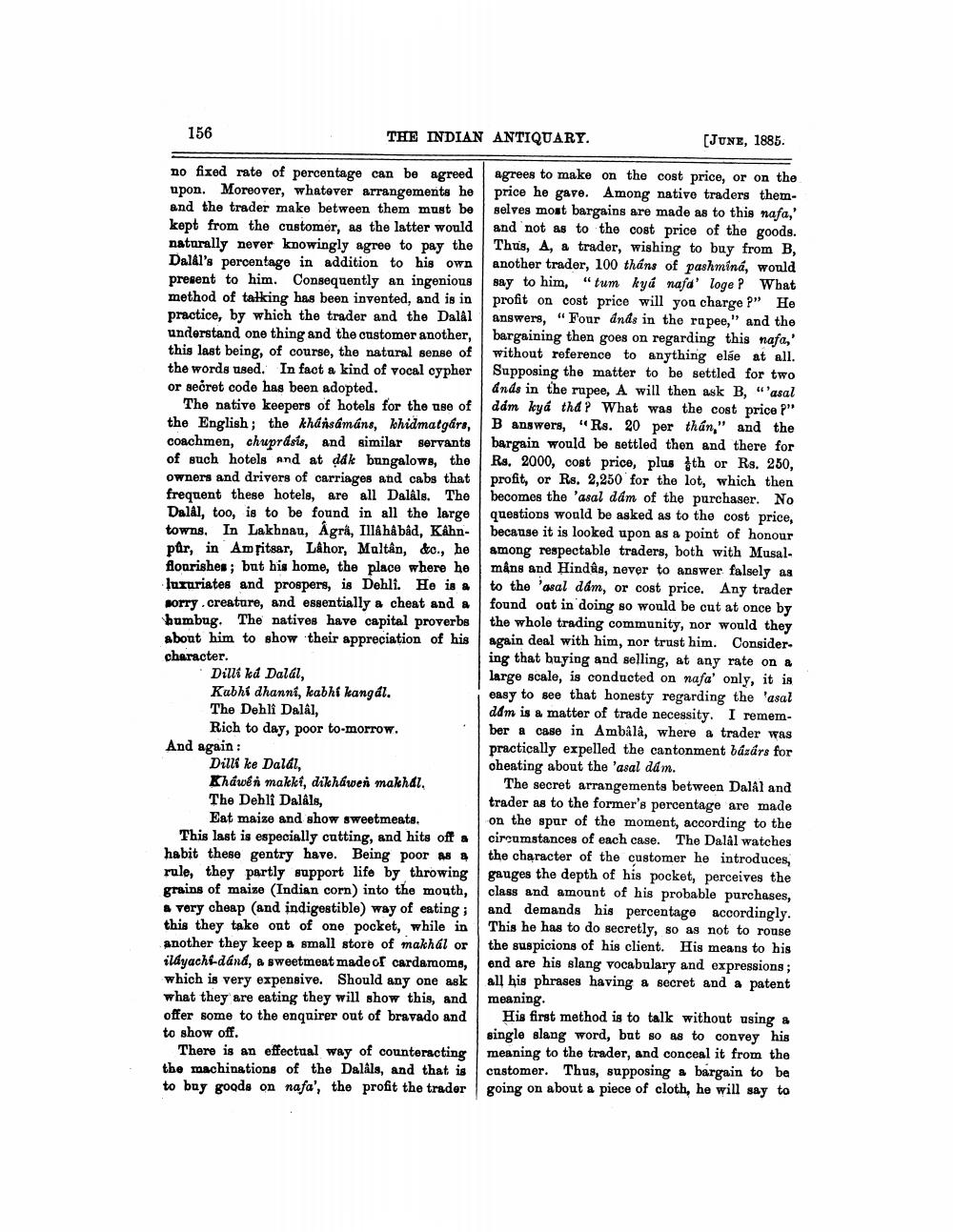________________
156
THE INDIAN ANTIQUARY.
(JUNE, 1885.
no fixed rate of percentage can be agreed agrees to make on the cost price, or on the upon. Moreover, whatever arrangements he price he gave. Among native traders themand the trader make between them must be selves most bargains are made as to this nafa,' kept from the customer, as the latter would and not as to the cost price of the goods. naturally never knowingly agree to pay the Thus, A, a trader, wishing to buy from B, Dalal's percentage in addition to his own another trader, 100 tháns of pashminá, would present to him. Consequently an ingenious say to him, "tum kyá nafa' loge? What method of talking has been invented, and is in profit on cost price will you charge P" He practice, by which the trader and the Dalal | answers, "Four ands in the rapee," and the understand one thing and the customer another, bargaining then goes on regarding this nafa,' this last being, of course, the natural sense of without reference to anything else at all. the words used. In fact a kind of vocal cypher Supposing the matter to be settled for two or secret code has been adopted.
ands in the rupee, A will then ask B, "'asal The native keepers of hotels for the use of ddm kya tha ? What was the cost pricep" the English; the khánsámáns, khidmatgars, B answers, "Rs. 20 per thán," and the coachmen, chuprásís, and similar servants bargain would be settled then and there for of such hotels and at dák bungalows, the Rs, 2000, cost price, plus th or Rs. 250, owners and drivers of carriages and cabs that profit, or Rs. 2,250 for the lot, which then frequent these hotels, are all Dalals. The becomes the 'asal dam of the purchaser. No Dalal, too, is to be found in all the large questions would be asked as to the cost price, towns. In Lakhnau, Agrå, Illahâbâd, Kåhn- because it is looked upon as a point of honour pür, in Amritsar, Láhor, Maltân, &c., he among respectable traders, both with Musal. flourishes; but his home, the place where he måns and Hindês, never to answer falsely as luxuriates and prospers, is Dehli. He is a to the 'asal dám, or cost price. Any trader sorry.creature, and essentially a cheat and a found out in doing so would be cut at once by humbug. The natives have capital proverbs the whole trading community, nor would they about him to show their appreciation of his again deal with him, nor trust him. Consider. character.
ing that buying and selling, at any rate on & Dilli kd Dalal,
large scale, is conducted on nafa' only, it is Kabhi dhanni, kabhi kangal.
easy to see that honesty regarding the 'asal The Dehli Dalal,
dam is a matter of trade necessity. I rememRich to day, poor to-morrow.
ber a case in Ambala, where a trader was And again :
practically expelled the cantonment bázárs for Dilli ke Dalál,
cheating about the 'asal dam. Kháwéi makki, dikhawei makhdl.
The secret arrangements between Dalal and The Dehli Dalâls,
trader as to the former's percentage are made Eat maize and show sweetmeats.
on the spur of the moment, according to the This last is especially cutting, and hits off a circumstances of each case. The Dalal watches habit these gentry have. Being poor as a the character of the customer he introduces, rule, they partly support life by throwing gauges the depth of his pocket, perceives the grains of maize (Indian corn) into the mouth, class and amount of his probable purchases, a very cheap (and indigestible) way of eating; and demands his percentage accordingly. this they take out of one pocket, while in This he has to do secretly, so as not to rouse another they keep a small store of makhal or the suspicions of his client. His means to his ildyachi-dánd, & sweetmeat made of cardamoms, end are his slang vocabulary and expressions ; which is very expensive. Should any one ask all his phrases having a secret and a patent what they are eating they will show this, and meaning. offer some to the enquirer out of bravado and His first method is to talk without using a to show off.
single slang word, but so as to convey his There is an effectual way of counteracting meaning to the trader, and conceal it from the the machinations of the Dalals, and that is customer. Thus, supposing a bargain to be to buy goods on nafa', the profit the trader going on about a piece of cloth, he will say to




